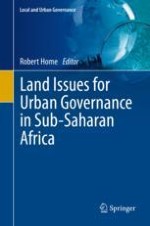2021 | OriginalPaper | Buchkapitel
12. Post-apartheid Housing Delivery as a (Failed) Project of Remediation
verfasst von : Zachary Levenson
Erschienen in: Land Issues for Urban Governance in Sub-Saharan Africa
Aktivieren Sie unsere intelligente Suche, um passende Fachinhalte oder Patente zu finden.
Wählen Sie Textabschnitte aus um mit Künstlicher Intelligenz passenden Patente zu finden. powered by
Markieren Sie Textabschnitte, um KI-gestützt weitere passende Inhalte zu finden. powered by
